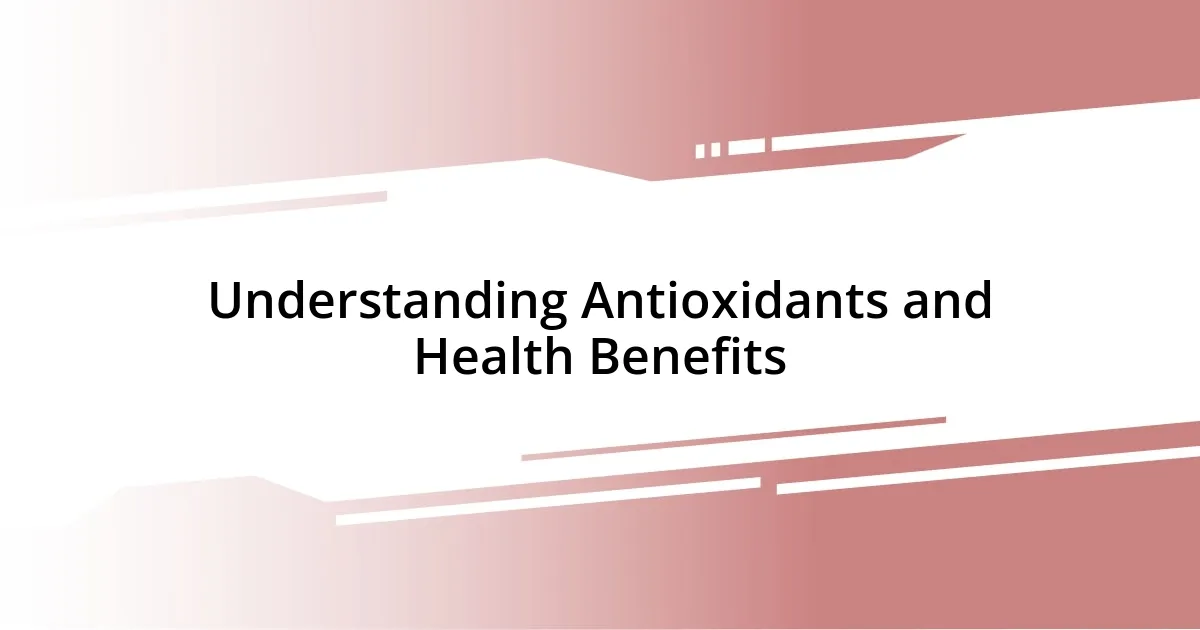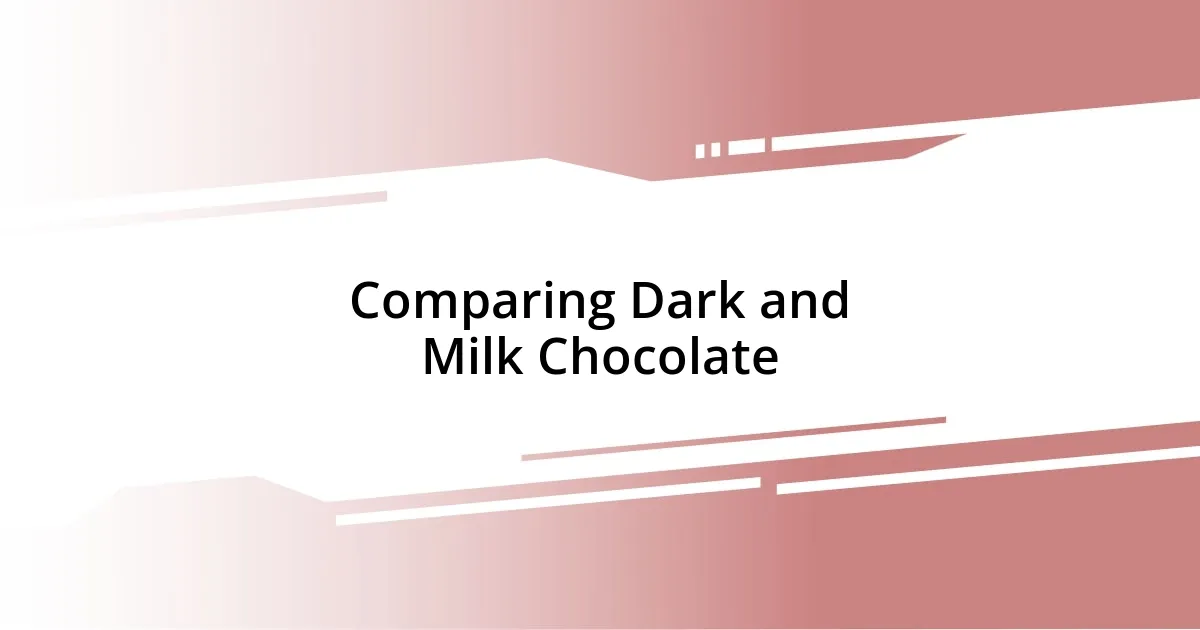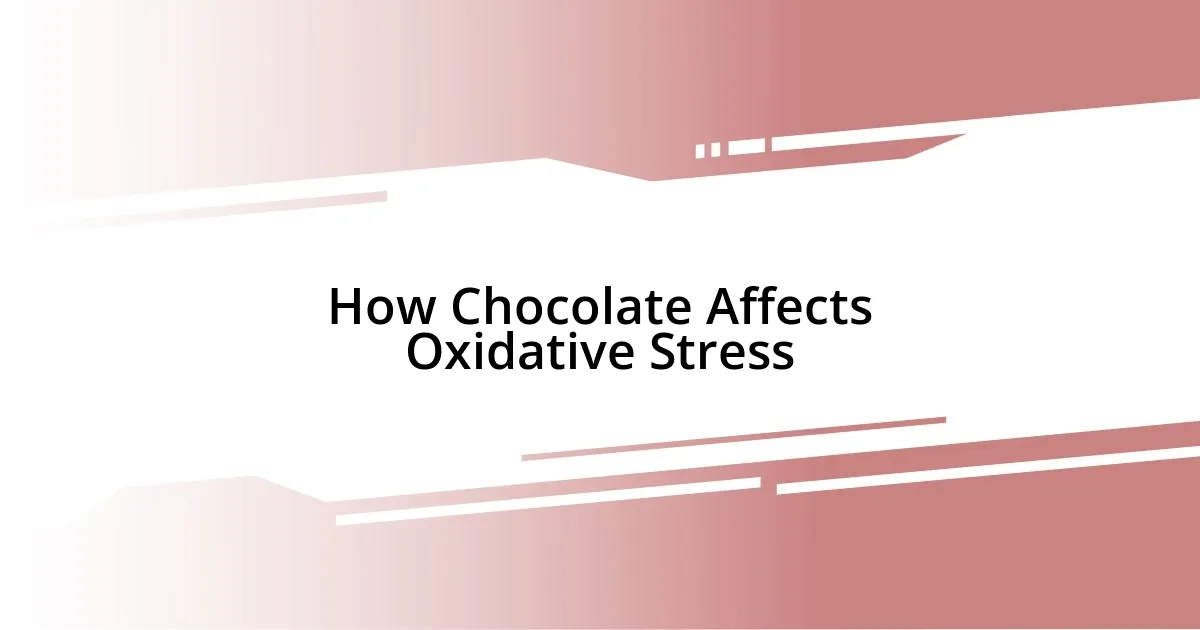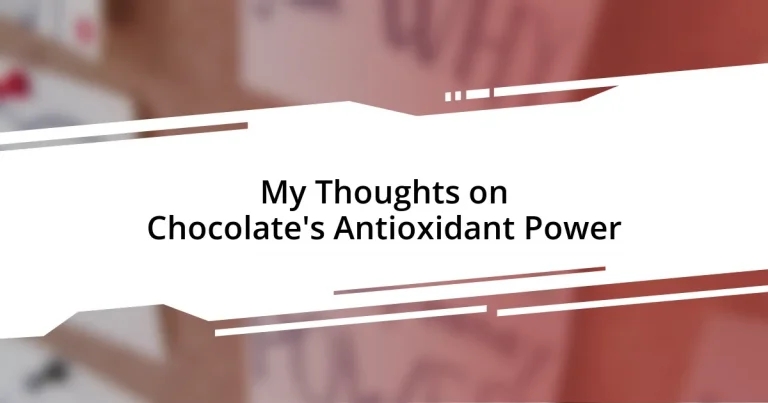Key takeaways:
- Antioxidants, found in foods like dark chocolate, help combat free radicals, reduce inflammation, and support overall health.
- Dark chocolate has a higher cocoa content and antioxidant levels compared to milk chocolate, contributing to heart health and improved circulation.
- Regular consumption of dark chocolate can lower oxidative stress markers in the body, enhancing wellness.
- Choosing high-quality dark chocolate (at least 70% cocoa) and consuming it in moderation maximizes health benefits while satisfying cravings.

Understanding Antioxidants and Health Benefits
Antioxidants are like little warriors in our bodies, fighting off free radicals that can cause cell damage. When I think about those moments, like when I feel a cold coming on, I reach for something rich in antioxidants, like dark chocolate. It’s fascinating to consider how something so indulgent can also contribute to my health—talk about a sweet win!
The health benefits of antioxidants are vast; they may reduce inflammation and lower the risk of chronic diseases. I remember a time when I incorporated more antioxidant-rich foods into my diet and felt a noticeable difference in my overall energy. Isn’t it amazing how something as simple as what we eat can have such a profound impact on our well-being?
Also, consuming antioxidant-rich foods can support skin health, which I find particularly relevant as I age. I can’t help but wonder, why wouldn’t I want to indulge in something delicious like chocolate if it could help keep my skin glowing? It’s empowering to know that with each bite, I’m not just treating my taste buds, but also investing in my health.

What is Chocolate’s Antioxidant Content
The antioxidant content in chocolate, particularly dark chocolate, is surprisingly impressive. It’s packed with flavonoids, a type of antioxidant that can support heart health and even improve blood flow. During a particularly stressful week, I treated myself to a couple of squares of dark chocolate, and I felt a wave of comfort wash over me—not just from the taste but also from knowing I was indulging in something beneficial.
Here’s a closer look at what makes chocolate a true contender in the realm of antioxidants:
- Dark chocolate contains high levels of flavonoids, especially catechins and epicatechins.
- It can have a higher ORAC (Oxygen Radical Absorbance Capacity) value, indicating its antioxidant strength.
- The more cocoa content, the greater the antioxidant benefits; look for products with at least 70% cocoa.
- These antioxidants contribute to better circulation and lower blood pressure.
- Studies suggest that regular consumption may enhance brain function over time.
Reflecting on it, I find it enlightening how something as decadent as chocolate can also be so rich in beneficial compounds. Just thinking about the health benefits, I feel like I’ve discovered a little secret that makes every bite a little more special.

Comparing Dark and Milk Chocolate
When it comes to comparing dark and milk chocolate, I often find myself leaning toward dark chocolate for its robust antioxidant profile. Dark chocolate typically contains a higher cocoa content, which means more flavonoids. I remember a cozy evening spent reading with a cup of herbal tea, enjoying the rich bitterness of dark chocolate; it felt like a little ritual that nourished both my body and spirit.
On the other hand, milk chocolate is often creamier and sweeter, which can make it more appealing to those with a sweet tooth. However, it tends to have lower antioxidant levels due to its higher sugar and milk content. I once shared a bar of milk chocolate with a friend at a party, laughing over how it was more of a nostalgic treat for us rather than a health choice—after all, it reminded us of childhood joys.
While both types of chocolate have their unique charms, choosing dark chocolate generally offers more in terms of health benefits. I’ve found that whenever I opt for dark, I’m not just indulging; I’m making a conscious decision to savor something that supports my health journey.
| Aspect | Dark Chocolate | Milk Chocolate |
|---|---|---|
| Cocoa Content | 70% or higher | Often 10-50% |
| Antioxidant Content | High in flavonoids | Lower than dark |
| Sugar Levels | Lower | Higher |
| Health Benefits | Supports heart health, improves circulation | Limited health benefits |

How Chocolate Affects Oxidative Stress
Oxidative stress happens when there’s an imbalance between free radicals and antioxidants in the body, leading to cell damage. When I first learned about oxidative stress, I was surprised to discover how much chocolate, particularly dark chocolate, can work against this. Every time I savor a piece of dark chocolate, I feel like I’m not just enjoying a treat but actively battling those harmful free radicals, which adds a satisfying layer to the experience.
The flavonoids in chocolate are pivotal in reducing oxidative stress. I recall a week filled with deadlines when a friend suggested a chocolate break to recharge. It was a moment of both indulgence and science; as we shared our favorite dark chocolate, it struck me that every bite was packed with potential health benefits, helping our bodies cope with the stresses of life. Isn’t it amazing how a simple snack can serve a dual purpose?
Regular consumption of chocolate can lead to lower levels of oxidative stress markers in the body. If you’re anything like me, you might wonder how something so delightful can contribute to overall wellness. It’s reassuring to know that by enjoying a few squares of dark chocolate a week, I’m not just treating myself to something delicious but also nurturing my body in a meaningful way. I believe it’s these little habits that can collectively make a significant difference in our health.

Practical Ways to Incorporate Chocolate
Incorporating chocolate into your daily routine can be both delightful and beneficial. I often start my day with a smoothie and sneak in a tablespoon of cocoa powder; it adds a rich taste and infuses my morning with antioxidants. Have you ever tried this simple switch? The energy boost I get from this morning ritual sets a positive tone for the rest of my day.
When it comes to snacking, I love pairing dark chocolate with nuts or fruits; it’s a great way to enhance the flavors while reaping the nutritional benefits. Picture this: I’m munching on almonds dipped in melted dark chocolate while watching a movie. Not only is it incredibly satisfying, but I feel like I’m treating myself well, combining indulgence with health. What’s your favorite chocolate pairing?
For a bit of sophistication, I like to end a dinner with a small piece of artisanal dark chocolate and a cup of herbal tea. It’s become a lovely ritual for me, a moment to pause and reflect on the day. I can’t help but feel a sense of gratitude for these small pleasures. How do you choose to celebrate your day?

Choosing Quality Chocolate Options
Choosing quality chocolate means looking beyond just satisfying your sweet tooth. I always head straight for the labels, opting for dark chocolate with at least 70% cocoa content. It’s fascinating how these high-quality options not only deliver more antioxidants but also provide a more intense, rewarding flavor. Have you ever noticed how satisfying a rich dark chocolate can be compared to a sugary milk chocolate?
The sourcing of the cocoa bean matters, too. I remember visiting a local chocolatier who emphasized the importance of ethically sourced beans. Each bite of the chocolate I purchased felt like a treat for both my palate and the planet. It’s not just about taste; supporting responsible practices adds a layer of enjoyment to my chocolate experience. Do you check where your chocolate comes from?
Lastly, I’m a firm believer in moderation, even with quality chocolate. When I indulge, I choose a small, beautifully crafted piece and take the time to really savor it. This mindful approach transforms the ordinary act of eating chocolate into something special. Have you ever tried slowing down to appreciate each bite? It’s remarkable how much more fulfilling a quality chocolate experience can be when we fully engage in it.












